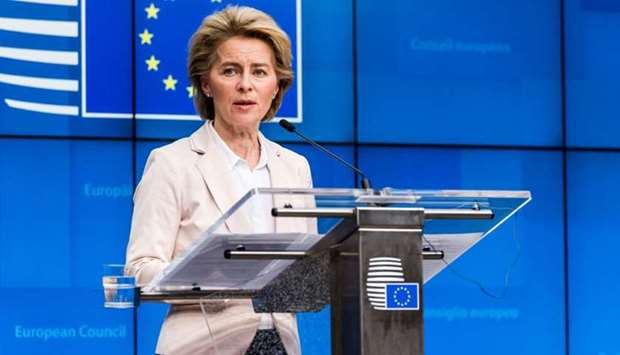Europe showed signs of rallying around virus-stricken Italy, even as its leaders fought to ward off a retreat from their country’s sovereign bonds.
In a letter to Italian newspaper la Repubblica, European Commission President Ursula von der Leyen admitted the bloc was late in understanding the scale of the outbreak in Italy and slow to act. She said Brussels has done far better recently.
The unusual admission comes amid fear that Italy’s debt market is still vulnerable to a mass exodus by investors, even with the European Central Bank offering support through its €750bn ($820bn) bond-buying program. The country’s yield spread over Germany, a key gauge of risk in the country remains elevated after last month’s virus-induced rout.
Former Italian Prime Minister and current EU economy chief Paolo Gentiloni told Bloomberg Television on Thursday that continued ECB support means that Italy won’t need a more formal bailout to ensure its public finances remain sustainable. The eurogroup of EU finance ministers is set to agree on a toolkit of measures Tuesday, he said, despite current divisions between countries.
“This is completely out of the outlook that we have,” said Gentiloni. “This is not the moment of this kind of risk. This is the moment of spending to face the immediate challenges that we have and building solidarity with common tools at EU level.”
Raw Nerve
Meanwhile, a Commerzbank AG note recommending investors close long positions in Italian bonds touched a raw nerve in the country, at a time when Prime Minister Giuseppe Conte is waging a campaign against credit lines linked to the European Stability Mechanism because of perceived stigma.
Italian leaders are focused on avoiding any such stigma and argue that it would be less costly for the euro area to issue joint bonds than to fight off attack from speculators in the future.
Deputy Economic Development Minister Stefano Buffagni reacted swiftly to the Commerzbank report, which also said the country would almost inevitably lose its investment-grade rating. “German Banks Attacking Italian Assets,” he wrote in a Facebook post.
Commerzbank’s assertions could cause “gigantic economic damage,” said Buffagni, of the anti-establishment Five Star Movement, the biggest party in the Italian coalition. “The German government must intervene immediately to block this folly.”
Italy’s 10-year yield spread over Germany was at 191 basis points yesterday, still around 70 basis points above the lows seen this year.
Ex-premier Mario Monti sided with Conte, saying that “Italy has done nothing to deserve this scourge, its government and its people have acted very responsibly.”
Monti, speaking to reporters yesterday, compared Italy’s situation to the euro-area debt crisis during his tenure as leader, saying, “this time there must not be a stigma as there was last time, other countries should be more understanding.”

Ursula von der Leyen, European Commission president, speaks during a news conference in Brussels.
